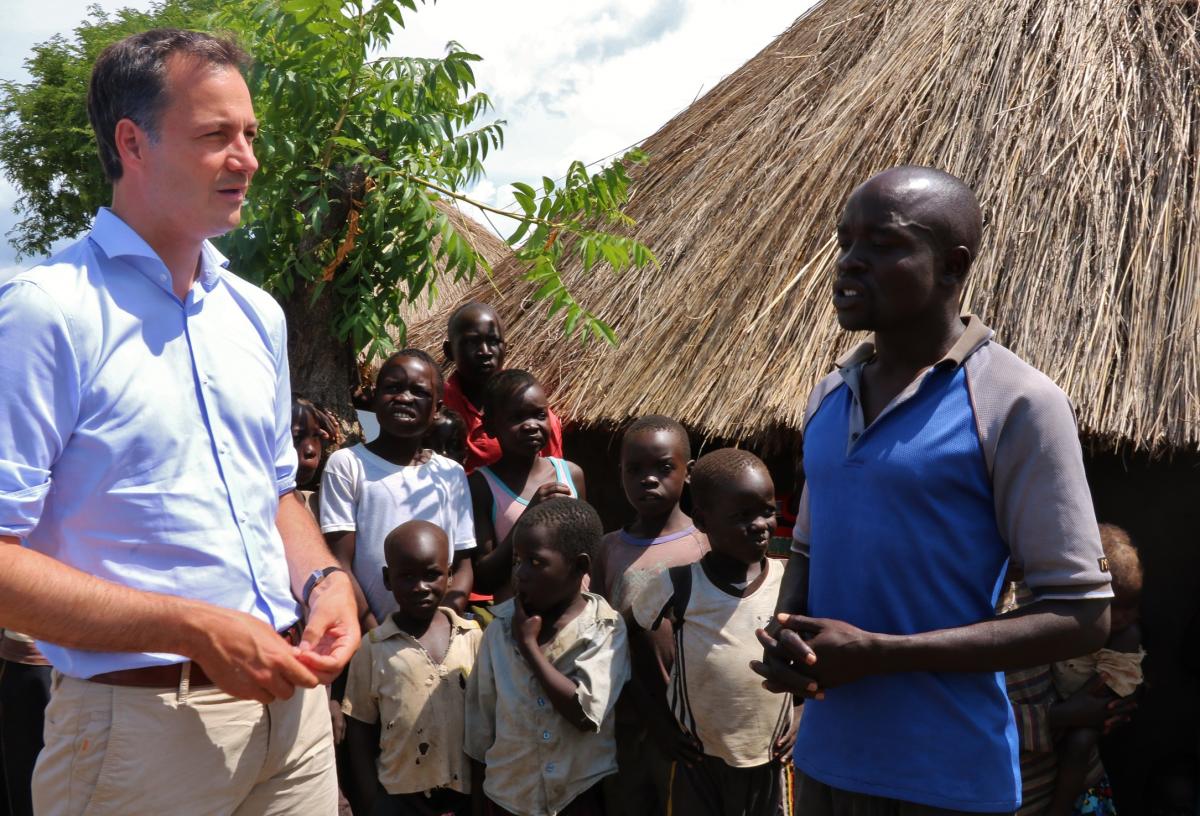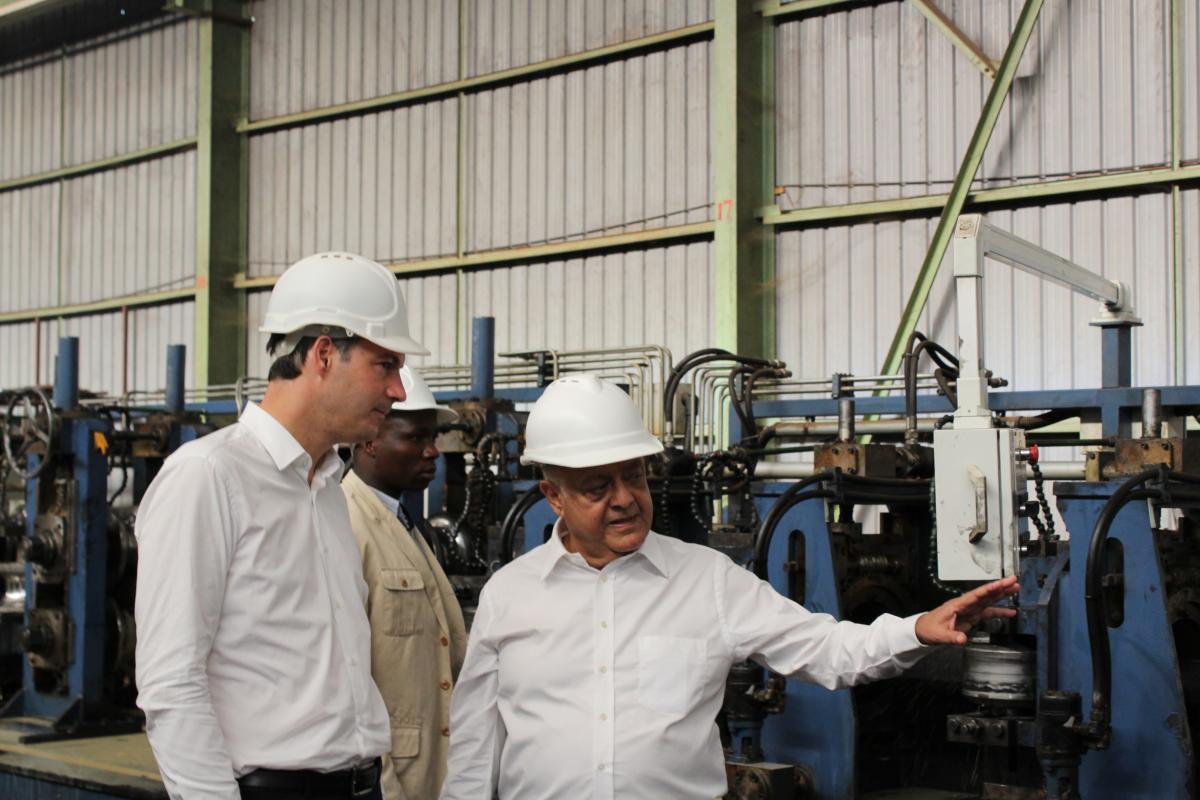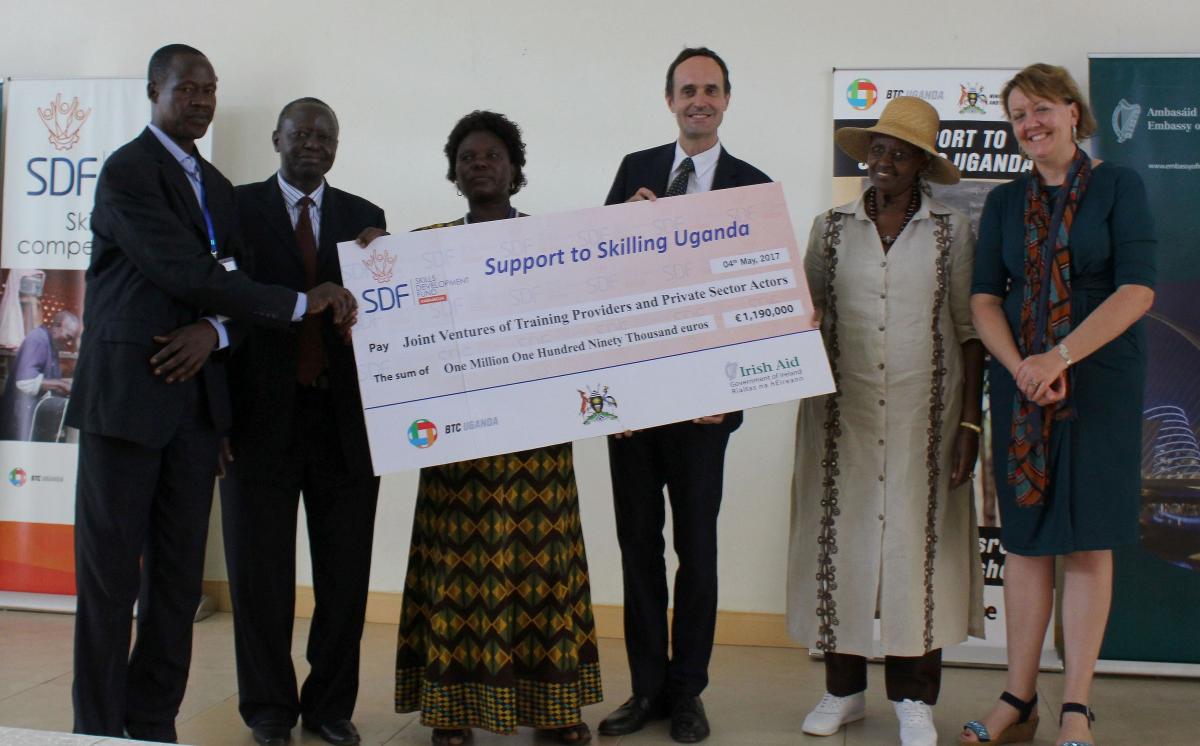Opzoeken
2190 - 2205 van 2520 nieuws bekijken
-
“In Uganda refugees get a chance to rebuild their lives” Minister Alexander De Croo visits the Bidi Bidi refugee settlement
Hanna DEKERK | 28/06/2017
On Thursday 22/06 Belgian Minister for Development Alexander De Croo visited the Bidi Bidi refugee settlement in Northern Uganda. Since the South-Sudanese conflict erupted in July 2016, Uganda has taken in 900.000 of its refugees. Bidi Bidi now hosts 270.000 people fleeing violence and hunger in South-Sudan, making it the 2nd largest settlement in the world after Syria. The Ugandan refugee policy is a particularly compassionate one, granting migrants land to build a home and the right to travel and work. Minister De Croo was impressed by the countries’ efforts, stating that “In Uganda refugees get a chance to rebuild their lives”. The nexus between development and humanitarian responseBTC is one of the three partners implementing a 4-year Support Programme for Refugee Settlements in Northern Uganda , a 20 million Euro programme funded by the European Union Emergency Trust Fund (EUTF). Throughout Uganda, BTC and the MOES are jointly implementing the Support to Skilling Uganda (SSU) project, which aims at making technical and vocational training more relevant for the local economic setting and more accessible. Within the EUTF funded programme in Northern Uganda, this means adapting skills development & entrepreneurship training to the needs of the refugee settlements and host communities. Finding its space in the nexus between development and the humanitarian response, SSU seeks to improve the quality and standardization of trainings by adapting the national Skilling Uganda approach to the specific skills needs of the refugee & host communities. Through the Skills Development Fund, SSU stimulates bottom-up joint ventures that provide vocational training and entrepreneurship support by partnering up with training providers, NGOs and the local private sector. During his visit, Minister De Croo visited pilot short-term trainings in soap making and hand water pump maintenance, supporting 30 women and girls selected in partnership with CEFORD, a community based organization, and 15 youth from the refugee and host communities. “"This is the way to go” For the most vulnerable, trainings are allocated via a voucher scheme of ‘instant trainings’ that supports livelihood and income generating activities for youth, women and girls of the refugees and host communities. The voucher scheme breaks down skills provision into its smallest possible form, hereby addressing humanitarian concerns through a development approach. Minister De Croo officially stated that “During my visit to the north of Uganda, I visited Belgian funded skilling projects strengthening the resilience of both South Sudanese refugees and host communities. Given the numerous protracted conflicts in the world, I am convinced this is the way to go.”
-
"Our doors are open" Minister Alexander De Croo visits the Roofings factory in Kampala
Hanna DEKERK | 26/06/2017
On Wednesday 21/06 the Support to Skilling Uganda project, together with the Belgian Embassy, organized a visit of Belgian Minister for Development Alexander De Croo to the Roofings factory in Kampala. Roofings Group employs over 2000 staff in Uganda, making it one of the country’s biggest enterprises. The company produces steel and plastic building products for both the local Ugandan market and the markets of the East African Community and COMESA. This is done through the principle of “local content”, where skills are needed for the localized production of goods for the East African market.“Our doors are open” BTC supports the Skilling Uganda Strategy proposes private sector involvement in skills development as the game changer in the Business, Technical and Vocational Education and Training (BTVET) system. The goal is to spearhead modern, innovative, demand driven skills development approaches that meet the needs of the Ugandan labour market. This can only be achieved by bridging the gap between the world of school and the world of work and creating public private partnerships in skills development.The visit to Roofings showcases how such a partnership on skills development can be approached together with the private sector. International experience shows that effective and relevant skills development systems are built on strong alliances with employers and the business sector. Such alliances involve joint efforts in policy development, planning, monitoring and quality assurance. However, equally important are partnerships in training delivery and training finance. As Mister Lalani, chairman and founder of Roofings, stated “Our doors are open to become more involved in skills development”. A Win-Win situation After a guided tour of the factory, Minister De Croo and the Roofings team discussed the Win-Win situation where the private sector engages in skills development for BTVET students and graduates through hands-on training and qualitative apprenticeships and internships, while at the same time easing the intake of well-trained future personnel and improving the quality of the company’s labor force. They agreed that work-based learning is indispensable to bridge the gap between the world of work and the world of training. Thierry Foubert added that through piloting a skills development fund together with the Private Sector Foundation of Uganda, BTC stimulates bottom-up public private partnership for innovating training modalities such as lifelong learning. The debate was rounded-up with the role of the private sector in setting up training and certification standards for BTVET. Practical tests can allow employees who acquired their skills on-the-job to obtain a valid certification, also for the informal economy. Minister De Croo added that “with the right certificate, that person can take a next step in his or her career.”
-
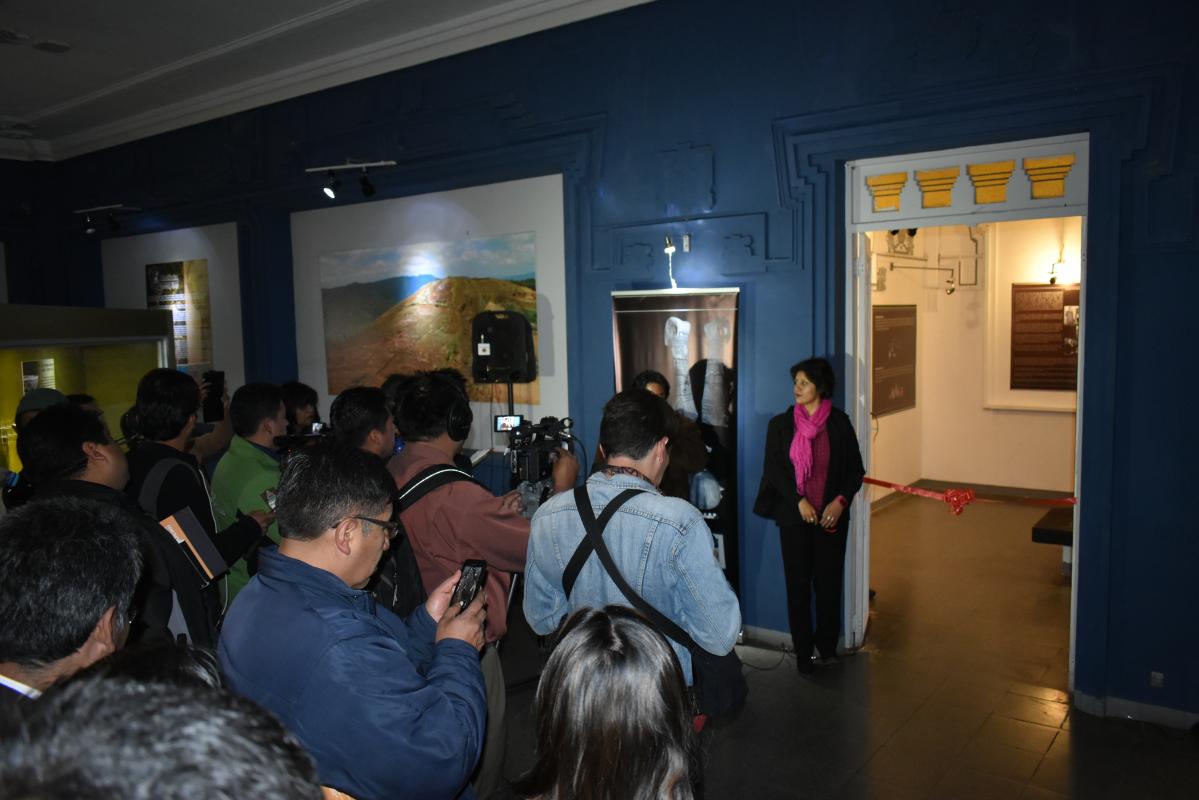
FORTALECIMIENTO DE LA UNIDAD DE ARQUEOLOGÍA Y MUSEOS
Agar TAMAYO | 23/06/2017
En el marco del Convenio Específico firmado entre el Reino de Bélgica y el Estado Plurinacional de Bolivia, relativo al Proyecto de identificación, registro y valorización del patrimonio cultural en la cuenca del lago Titicaca - Proyecto del Lago, se identificó la necesidad de mejorar la gestión comunitaria del patrimonio y la promoción de turismo comunitario en 13 municipios priorizados. A inicios del año 2014 el Ministerio de Culturas y Turismo (MCyT) de Bolivia solicitó a la Cooperación belga el financiamiento del Proyecto del Lago, apoyo que fue aprobado durante la Comisión Mixta entre Bélgica y Bolivia que se llevó a cabo el 27 de febrero 2014. El monto total del aporte de contra parte belga asciende a 1,5 millón de euros. El Ministerio de Culturas y Turismo cuenta con un aporte propio de Euro 99.706. El Proyecto del Lago tiene una duración de 3 años y medio (2016-2019) y se ejecuta bajo la modalidad de administración directa.En el marco del Resultado 2.5. del Proyecto del Lago del Documento Técnico Financiero (DTF), que busca “Fortalecer la Unidad de Arqueología y Museos - UDAM con equipamiento moderno para el registro cartográfico y documental del patrimonio arqueológico nacional a su cargo, así como el desarrollo de capacidades de gestión especializada en patrimonio en su personal técnico profesional”, se contempla la compra de varios equipamientos para fortalecer los trabajos de arqueología. Principalmente se benefician los 13 municipios priorizados por el Proyecto del Lago, el Ministerio de Culturas y Turismo y las instituciones estatales del Estado Plurinacional de Bolivia que trabajan en la identificación, registro, conservación y preservación del patrimonio arqueológico.Proyecto del Lago
-

Edu2Review – the first website for education quality rating in Vietnam
Huong TRANTHANH | 22/06/2017
edu2review.com is the first website where the quality of educational institutions such as language teaching centers, schools and universities are publicly rated. The site matches learners with prestigious institutions and helps learners make decisions on the most suitable learning options.The webpage was launched in 2016 by EBrand Index Value Joint Stock Company (EBIV JSC), a pioneering technology company in Vietnam specialized in providing solutions to build individual and institutional credit index. Joining the Technology Business Incubation Centre at Ho Chi Minh University of Technology in January 2017, EBIV JSC is now among the most promising clients there.The business incubator center is a partner of the Business Incubator Policy Project (BIPP), established as a science-technology organization directly under Ho Chi Minh City University of Technology. The center now provides incubatees with support for infrastructure, mentoring and business development services such as market survey and marketing, business planning, information on product ideas and technologies, etc. The incubatees also receive advice on legal subjects and procedures, intellectual property rights, technical training courses on business plan development, market development and expansion, business development strategy, financial management and other soft skill trainings for its employees.Aside from such fundamental support, the incubator center provides EBIV with information on disparate funding for Science & Technology product research and development, developing and expanding relationships with communities, organizations and enterprises, making networks, finding cooperation opportunities with domestic and international enterprises. All support offered by the incubation center is critical to the company's development trajectory, especially in the initial stage when EBIV is still a fledgling enterprise. Given the current situation in Vietnam when start-ups mushroom at an incredible rate, many succeed while the others fail, EBIV chooses to rely on the center's support and assistance while continuously enhancing its capacity. EBIV is striving to become the number one education review website with millions of visitors per month by July 2017. Hopefully, after graduating from the incubation center, EBIV can gain further momentum to become self-sustainable. More detailed information can be found on the website http://bipp.vn/en/news-and-events/83-ebiv-jsc-potential-incubatee-of-hcmut-tbi
-
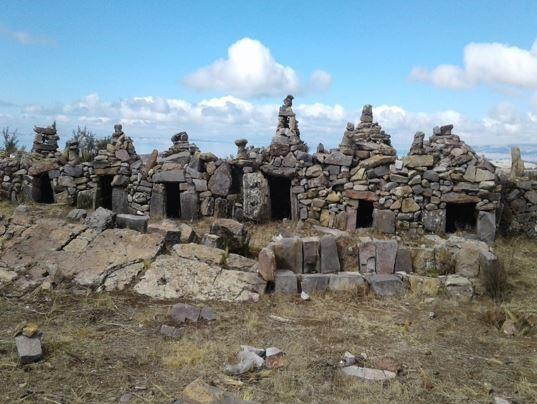
Tito Yupanqui será el primer municipio en proteger su patrimonio con una ley
Agar TAMAYO | 20/06/2017
Copacabana, Mayo 2017 - La Paz, Bolivia El Gobierno Autónomo Municipal de Tito Yupanqui promulgará el día viernes 5 de mayo 2017 la primera “Ley autonómica municipal de protección del patrimonio cultural arqueológico”. Esta norma fue construida en base a la Ley No. 530 del Patrimonio cultural boliviano con el apoyo del Proyecto del Lago. Este Proyecto es ejecutado por la Cooperación Técnica Belga y el Ministerio de Culturas y Turismo, cuyo financiamiento económico viene del Reino de Bélgica y del Tesoro General de la Nación, gracias a la solicitud impulsada por el Presidente Evo Morales. Se trata de una herramienta jurídica que busca operativizar la gestión integral del patrimonio a nivel municipal. Tito Yupanqui será el primer Municipio de los 339 municipios existentes en Bolivia en contar con esta norma de protección de su patrimonio. Para dicho evento el Municipio está preparando un gran evento, en primera instancia invitó a la Ministra de Culturas y Turismo Lic. Wilma Alanoca, a los Viceministros de Interculturalidad y de Turismo, a los directores de Patrimonio y Turismo, y por supuesto a los representantes de la Cooperación Internacional. Para esta fecha, el Municipio está impulsando una singular muestra de su patrimonio material e inmaterial, entre ellos una presentación de su música y danza autóctona, una exposición de su artesanía local, de sus tejidos, platos tradicionales, de sus espacios turísticos como la Gruta del Encanto, la Isla del Amor, su Iglesia Colonial, Inca Pucara, Ruta 8, la única cancha de fútbol de césped natural, de la región, situada a 3.810 m.s.n.m. etc. El Municipio Tito Yupanqui se encuentra en la Provincia Manco Cápac del Departamento de La Paz, entre los municipios de San Pedro de Tiquina y Copacabana. Según datos del último censo nacional realizado el año 2012, su población es de 6.261 habitantes, de los cuales 3.177 (51%) son mujeres y 3.084 (49%) son hombres. El Proyecto del Lago, cuyo nombre completo es “Proyecto de Identificación, Registro y Valorización del Patrimonio cultural en la cuenca del Lago Titicaca, Bolivia” viene ejecutándose desde el primer trimestre del año 2016, por una duración de 3 años. Este Proyecto desarrolla actividades en 13 municipios priorizados en los que se vienen construyendo estas herramientas jurídicas que se encuentran en diferentes etapas de avance. Los municipios priorizados por el Proyecto son: Tito Yupanqui, Puerto Acosta, Escoma, Puerto Mayor Carabuco, Ancoraimes, Santiago de Huata, San Pedro de Tiquina, Copacabana, Batallas, Pucarani, Tiahuanaco, Puerto Perez y Guaqui. El objetivo general del Proyecto del Lago busca Contribuir a mejorar la gestión comunitaria del patrimonio cultural de la cuenca del Lago Titicaca y promover el desarrollo del turismo cultural comunitario. Para ello se llevan adelante investigaciones arqueológicas subacuáticas, terrestres, formación en buceo deportivo y arqueológico, formación de líderes locales y gestores municipales, capacitación en desarrollo de emprendimientos de turismo comunitario, desarrollo de planes municipales de turismo, desarrollo de capacidades locales administrativas y jurídicas para la protección del patrimonio cultural, construcción de instrumentos de gestión y normativas para la protección del patrimonio arqueológico cultural, entre otras actividades que se encuentran en proceso de ejecución. En ese sentido, el Municipio de Tito Yupanqui, al igual que los otros 12 municipios priorizados, encaró con mucha determinación la ejecución de este Proyecto, brindando su respaldo a cada uno de los eventos que se desarrollaron hasta la fecha, convocando a sus autoridades originarias, juntas vecinales, etc. eventos en los que el Municipio participó junto a su alcalde Ing. Eugenio Achu y sus concejales en pleno. El 05 de mayo 2017, día de la promulgación de la “Ley autonómica municipal de protección del patrimonio cultural arqueológico”, el Municipio de Tito Yupanqui pasará a la historia siendo el primer municipio que trabaja con seriedad la temática de su patrimonio material e inmaterial. Seguidamente se preve que los otros 12 municipios también aprueben y promulguen sus normas.
-
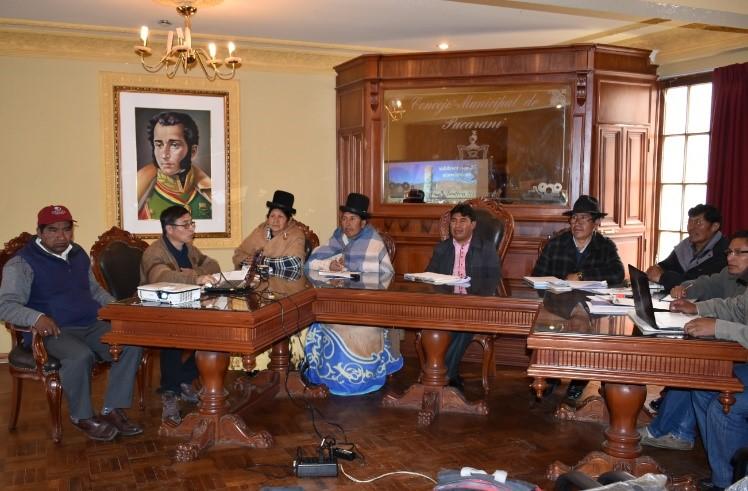
El Proyecto del Lago promueve normas de protección del patrimonio cultural arqueológico municipal
Agar TAMAYO | 20/06/2017
Copacabana, Marzo/2017La Paz, BoliviaEn el marco del “Proyecto de Identificación, Registro y Valorización del Patrimonio cultural en la cuenca del Lago Titicaca, Bolivia” – Proyecto del Lago, ejecutado por la Cooperación Técnica Belga (CTB) y el Ministerio de Culturas y Turismo (MdCyT), desde el 9 de enero de la gestión 2017 se vienen desarrollando talleres para contar con Instrumentos de gestión y normativas para la protección del patrimonio arqueológico cultural en 13 municipios de la cuenca del Lago Titicaca como parte de los sub resultados que el Proyecto del Lago busca alcanzar.Se han realizo visitas a los municipios de Puerto Acosta, Escoma, Carabuco, Ancoraimes, Santiago de Huata, Copacabana, Tiquina, Tito Yupanqui, Batallas, Puerto Pérez, Pucarani, Tiwanaku y Guaqui, en las cuales realizaron talleres para la construcción de herramientas jurídicas de protección del patrimonio cultural arqueológico junto a los alcaldes, concejales y autoridades originarias de los municipios priorizados. “Nuestra norma de protección del patrimonio arqueológico municipal tendrá el número 30”, dijo David Flores Amaru presidente del Concejo del Gobierno Autónomo Municipal (GAM) de Pucarani a manera de motivar su ágil procesamiento entre los concejales de este municipio para su pronta construcción, aprobación y promulgación.En la misma línea la Alcaldesa de Guaqui Beatriz Arce, señaló “creo que con este taller de herramientas jurídicas realizado en el municipio de Guaqui con las autoridades originarias hemos visualizado un poco más el cuidado del tema patrimonial, hacer la protección a todos nuestros lugares arqueológicos que tengamos, conocer las normativas, y también ver como nuestro municipio puede normar el cuidado del tema patrimonial…”, mencionó que el municipio quiere completar rápidamente la construcción de las herramientas jurídicas entre los técnicos del municipio con el apoyo de la ONG para luego socializarlo y validarlo con las bases antes de su aprobación y promulgación. En los 13 municipios, tanto autoridades municipales como originarias realizan intercambios y largas discusiones acerca de la viabilidad de la propuesta de una Ley Municipal de protección del patrimonio arqueológico. “…Contar con una persona dedicada a la gestión integral del patrimonio implica un presupuesto anual, pero vamos a hacer los esfuerzos, tenemos proyectos arqueológicos, tenemos los sueños a través de la investigación que está haciendo el Proyecto del Lago, el resultado final de investigación sobre este municipio, etc…”, dijo David Marconi Calle, alcalde del GAM de Tiquina. Todos los GAMs muestran bastante interés en contar con esta herramienta jurídica para luego desarrollar una gestión integral del patrimonio, velando por su registro, conservación, protección e investigación, así como operativizar las declaratorias, medidas de salvaguardas, recuperación de piezas arqueológicas, etc. Por supuesto, algunos municipios están decididos a impulsar su promulgación en el menor tiempo posible para ser los pioneros en la legislación de esta temática en la cuenca del Lago Titicaca, en una sana competencia. Las personas integrantes de estas jornadas de discusión de los artículos que contemplan estas normas jurídicas, entienden la responsabilidad que implica su puesta en marcha, puesto que implicará el funcionamiento formal de una oficina que atienda la temática del patrimonio arqueológico y también requerirán recursos económicos para su implementación. Proyecto del Lago
-
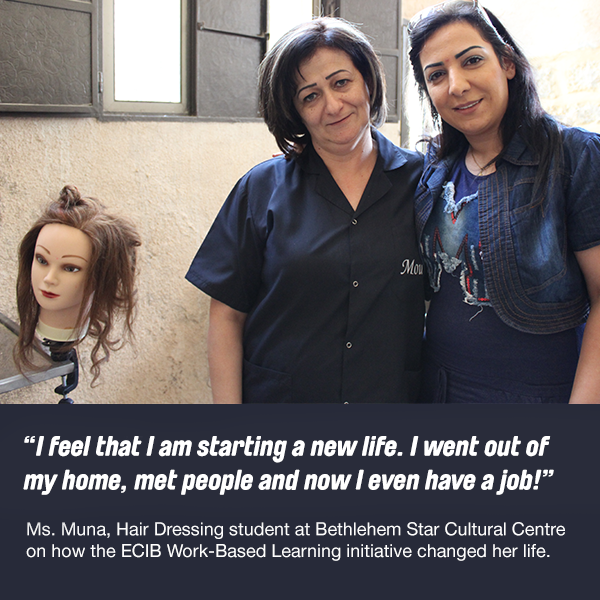
Success Stories After the WBL Initiative: Bethlehem Star Cultural Centre
Laura SCHILLEMANS | 19/06/2017
One of the main goals of the ECIB Work-Based Learning (WBL) initiative is to create a sustainable and accessible apprenticeship program that allows Technical and Vocational Education and Training (TVET) institutions to offer working experience in companies from the private sector, in a wide range of vocations, to students from all backgrounds.Multiple success stories prove that the apprenticeship program is very effective in battling unemployment and in ensuring a smooth transition from education to employment.One of these success stories comes from the Hair Dressing initiative at the Bethlehem Star Cultural Centre. Six months after their graduation, most of the school’s WBL graduates are now employed or started their own business. Thanks to the strong relationship with the private sector, that was created during the period of the WBL initiative, the school is able to continue sending new groups of students to different hair salons in the established network, even after the WBL program has ended. Moreover, the Bethlehem Star Cultural Centre continues to encourage men and women from disadvantaged backgrounds to participate in the program.One of the future graduates is Muna, an older woman who joined the second group of hair salon trainees at Bethlehem Star Cultural Centre and who will be employed by the hair salon after finishing her internship.“When she filled in her application at Bethlehem Star, we saw her age and we felt that it would be better to help a younger girl (…). After two weeks she came again and entered the application once more. Then I decided to study her: She has problems at home and she stayed at home all her life and didn’t study. I felt that I had to help her and give her the chance so I signed the application. I gave her the chance and I was right, thank God, she is excellent now and the partnership will employ her and give her a salary” (Ms. Julia Hanania, director of Bethlehem Star Cultural Centre)“I feel that I am starting a new life. I went out of my home, met people and now I even have a job!” (Ms. Muna, student at Bethlehem Star Cultural Centre)”
-
Call for proposals 2017 - short training and capacity building innitiatives
Huong TRANTHANH | 12/06/2017
The project Facility for Capacity Building (FCB) is inviting public institutions at provincial level and higher education institutions to submit concept notes on capacity building initiatives to compete for FCB grants. This is the second call for proposals from the project, which aims for supporting public institutions to implement short trainings, workshop, study tours, coaching and mentoring activities to enhance the capacity of their staffs. The full call for proposal and guidelines for applicants can be obtained by contacting the PMU at minhtam@moet.edu.vn or ha.daothingan@btcctb.org. The deadline for applications is 30th June 2017.The PMU has selected 6 proposals from the call in 2016. Organizational assessment are underway before finalizing grant agreements by mid August 2017.
-
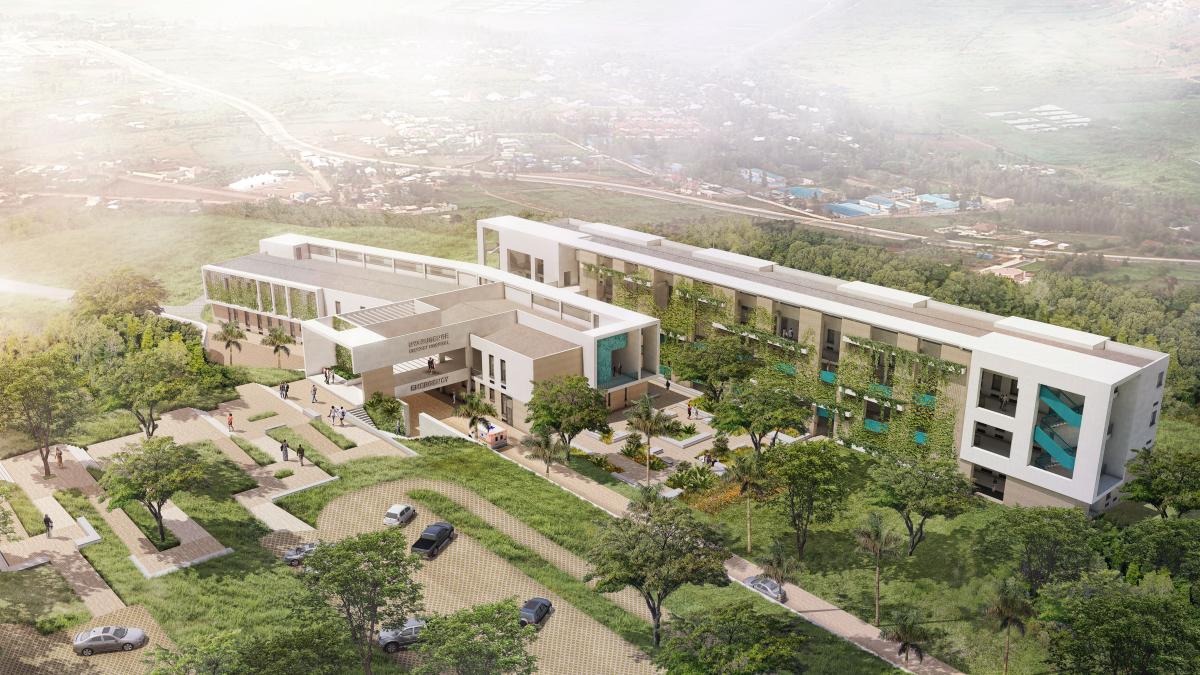
Nyarugenge Hospital - Approved design
Alexis DE HERDE | 06/06/2017
As part of our health sector programme Ubuzima Burambye, we are going to construct of a 120-bed district hospital in Nyarugenge. The hospital will be located in the Nyamirambo Sector. It will be constructed on a surface area of 2 hectares. A second phase is planned to extend the capacity of the hospital to 300 beds. The total surface of the buildings would reach 4 hectares. So far in phase one the hospital will have 3 components: 1. Block X will be made of reception, emergency services, administration rooms, a laboratory and an outpatient department. 2. Block Y will include a maternity ward, an hospitalisation ward, and two operating theatres. 3. Block U will include a utility block comprising a mortuary, a laundry and a workshop. The design of the project has now been approved. The construction should start in the coming weeks. We will keep you posted!
-
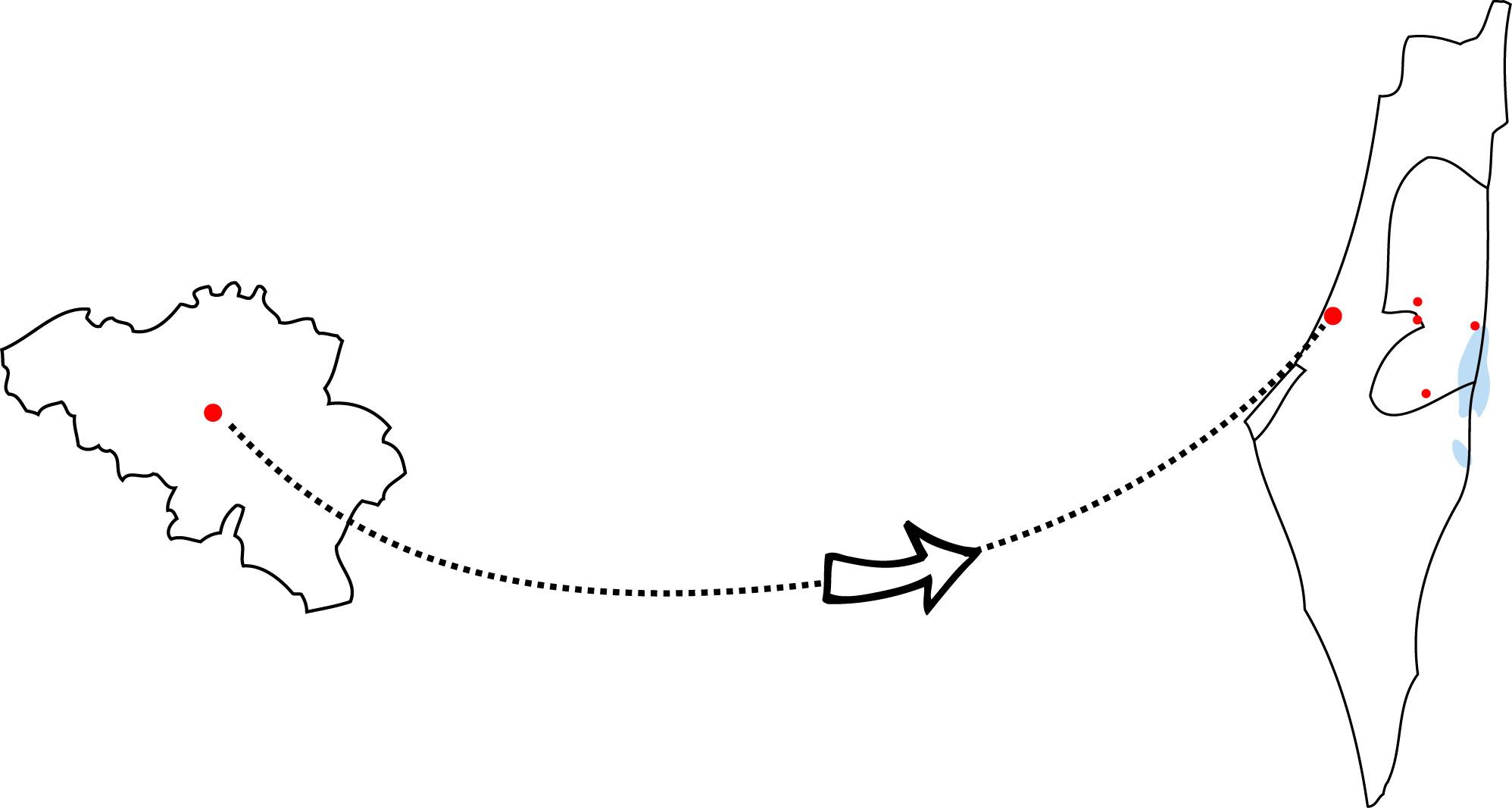
Belgian youth visiting the Palestinian Territory and Israel
Laura SCHILLEMANS | 31/05/2017
After Ramadan, the LGRDP program is welcoming a delegation of 20 young Belgian students enrolled in the Belgian organization OIRD (Organisation Internationale pour la Réussite et le Développement; www.oird.org). The young students, born in Belgium but coming from socially and economically vulnerable communities or belonging to ethnic minorities, will discover the development cooperation (the work of BTC, and in particular the LGRDP program), the territory of Palestine and Israel, as well as the difficulties people face here. Along the journey they will visit the bigger cities such as Jerusalem, Hebron, Bethlehem, Ramallah and Tel Aviv, but will also be hosted by families of Al Karmil Municipality (small village South-East of Hebron and part of the LGRDP program) and Palestinian Bedouins. Many questions will be raised and addressed: What is the overall aim of development cooperation? What does BTC do? What are the conditions BTC works in? What are the objectives and aims of the LGRDP program? What are the difficulties Palestinians face? How does the life in the Palestinian Territory affect schooling youth? Etc. In addition, an exchange/dialogue between Israelis, Palestinians and the Belgian students will be set up in cooperation with the Willy Brandt Center in Jerusalem. The whole trip, including preparations, will be filmed. This documentary will focus on the “discovery of the Palestinian Territory” and the view of the young people on development cooperation, identity, solidarity and the (political) situation. The documentary will be a mixture between public and private spaces and situations, between discovery and analysis. All meetings and visits will be filmed and in parallel interviews with the youth will take place to follow their thoughts and enrich the events with personal point of views.
-
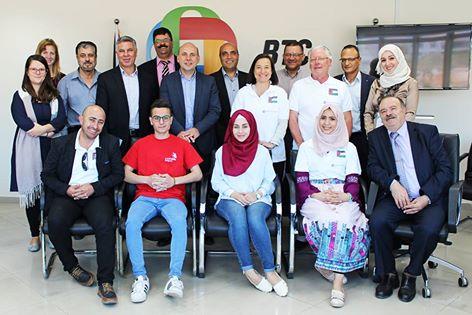
Belgium supports PalestineSkills
Laura SCHILLEMANS | 30/05/2017
On the 24th of May 2017 Ms. Florence Duvieusart, Consul and Head of Development Cooperation at the Consulate General of Belgium met the two young Palestinians who were selected to compete in the PalestineSkills competition and their trainers to hear about their experiences and their preparations for the upcoming WorldSkills competition in Abu Dhabi. Sobheya Abumusallam is a 21-year old graphic designer from Nablus. She won the silver medal at the first PalestineSkills National Competition. Ibraheem Qawasma is a 20-year old graphic designer from Hebron. Ibraheem won the gold medal at the first PalestineSkills National Competition. In order to prepare for this competition, Sobheya, Ibraheem and their trainers, supported by the Belgian Development Agency (BTC), received an intensive training in Belgium over the course of 2 weeks in March 2017. In his introduction Mr. Michael Buechele, Technical Delegate of WorldSkills Palestine, stressed the importance of training the trainers, because without them good results wouldn’t be possible. Both Sobheya and Ibraheem emphasized how important it was to exchange experiences with the Belgian trainers to give them a different look on international graphic design standards and techniques. Later this year both of them will participate in the WorldSkills competition in Abu Dhabi as well. This unique skills competition is aimed at raising interest for vocational training, showcasing the excellence of young talents from over 70 member countries competing in some 50 different domains as diverse as pastry making, painting, graphic design, carpentry, electronics and many more. For the Palestinian youth it will be the first time they have the opportunity to participate. During his opening remarks Mr. Bart Horemans, International Technical Advisor ECIB at BTC, emphasized the importance of supporting Technical and Vocational Education and Training (TVET) in partnership with the private sector to tackle youth unemployment in the Palestinian Territory. TVET graduates have an 80% employment rate thanks to traineeships and Work-Based Learning (WBL) in the private sector. About the Enhancing Capacities for Institution Building (ECIB) Program Since 1997, the Belgian Government has been supporting the development activities and emergency interventions in the Palestinian Territory. Since July 2013 the ECIB program focuses on improving the qualitative and quantitative aspects of Work Based Learning (WBL) Initiatives in the Technical and Vocational Education and Training (TVET) programs in the Palestinian Territory in partnership with the Ministry of Education, the Ministry of Labour and the private sector.
-

A la conquête de nouveaux clients
Meriem HILALI | 29/05/2017
Le safran est surtout vendu via des circuits informels, aux mains de quelques intermédiaires, agissant de concert pour peser sur les prix du safran, au souk hebdomadaire. Les producteurs les plus fragiles vendent une partie de leur récolte à bas prix dès la fin de la récolte afin de pouvoir financer leurs dépenses immédiates.L’objectif est qu’à l’avenir, les groupements d’intérêt économique, dont celui pour lequel travaille Hassan, achètent et commercialisent la majorité de la récolte du safran à un prix plus juste et équitable. En 2016, le prix de vente perçu par les producteurs via les ventes à leur coopérative ou GIE est de 0,50 € par gramme supérieur au prix du souk.Renforcer les capacités commerciales des groupements d'intérêt économique permet d’ouvrir une voie alternative, de commercialiser le safran à travers des circuits formels. Si on y combine une hausse de la qualité du safran, c’est tout bénéfice pour le producteur ! Voilà le pari, le parti pris de Khadija, Fatima, Fatima-Zahra, An et Hassan.
-

Le laboratoire, un enjeu majeur pour la filière
Meriem HILALI | 26/05/2017
La qualité du safran fourni par les coopératives n’est pas toujours clairement définie, ce qui rend difficiles les ventes, notamment sur les marchés à haute valeur ajoutée. D’où l’importance du travail de Fatima-Zahra et An et la mise en place d'un système d’évaluation de la qualité.Logé dans la Maison du safran, à Taliouine, non loin des safranières, le laboratoire mis en marche par Fatima-Zahra et An est une première au Maroc, par son accessibilité financière et géographique. Nul besoin de courir jusqu’à Agadir ou toute autre ville pour effectuer des analyses.Goût, odeur, couleur, humidité, volatilité… autant de critères qui déterminent la qualité du produit. En 2016, 84 % des échantillons de safran analysés ont été classés en catégorie 1 (sur une échelle de 3). Grâce à ce système d'évaluation de la qualité, basé sur des critères physiques et scientifiques, reconnus au niveau international (ISO 3632-1-2011), le prix payé aux producteurs est fonction de la catégorie du safran fourni. Prochainement, cela se reflètera aussi sur le prix de vente au consommateur. Une gamme de produits avec des prix différenciés selon le niveau de qualité sera en effet proposée.Ce système incite les producteurs à améliorer la qualité de leur produit pour en obtenir un meilleur prix. Faut-il encore qu’ils en connaissent les tenants et les aboutissants...
-

Merveille, la fille maçonne.
Julie CLAASSENS | 24/05/2017
Sûre d'elle, Merveille raconte pourquoi elle a choisi l'option maçonnerie à l'Institut Technique Professionnel Labo de Gemena.En RDC, à peu près quatre millions d'enfants vont à l'école, mais ce nombre représente seulement la moitié de tous ceux qui devraient être à l'école. Lorsque les ressources sont rares dans la famille et des choix doivent être faits, les filles restent souvent à la maison, tandis que les garçons sont envoyés à l'école.En Equateur, le Programme d’Appui à l’enseignement technique et à la formation professionnelle dans les districts de la Mongala et du Sud Ubangi vise l’amélioration de la qualité de la formation (surtout de la formation pratique) des élèves et des apprenants, avec une attention particulière pour les filles, pour une meilleure insertion sur le marché de l’emploi, dans l’économie familiale ou pour un travail autonome. Le projet part d’une vue globale sur le système d'enseignement qui permet de tenir compte des éléments essentiels pour arriver à améliorer le fonctionnement des écoles et centres de formation ciblés.
-
Closing the skills gap through livelihood actors
Hanna DEKERK | 24/05/2017
On the 4th of May in Moroto, the Support to Skilling Uganda (SSU) project launched the Skills Development Fund (SDF) and opened the Regional Skills Development office for Karamoja. Partners from the local and national level gathered to learn about the funding opportunities of the SDF and to visit the new office, all in the presence of First lady and Minister of Education, Janet Museveni. This component of the Support to Skilling Uganda project is financially supported by Irish Aid for 6 million euros and will be implemented from 2016 to 2020. Irish Ambassador in Uganda, Donal Cronin added “We are confident that with Irish Aid’s underground experience operating in Karamoja and the great expertise of BTC in skills development, we will get the program to work for the people of that region.” “Karamoja has many economic opportunities” The SDF for Karamoja aims at establishing work-based learning and to let skills development respond to the needs of Karamoja’s labor market. The fund will be awarded to Public-Private-Partnerships between local training providers and private sector actors that jointly and in a flexible way, organize relevant and qualitative trainings. As Karamoja is currently transitioning from an emergency context to one of post-conflict development, these training providers are mostly working on livelihood activities. This allows them to skill professionals in domains like water sanitation, irrigation techniques, etc. The launch gathered private sector members and political authorities from the national level as they are needed to further develop and implement priority sectors. Local authorities, civil society and livelihood actors were also present as they play a key role in the projects’ implementation. The event emphasized the contributions of all these stakeholders in the success of the project. In the words of Belgian ambassador Hugo Verbist: “Karamoja has many economic opportunities and we need to make that count.” Reaching the Karamojong In February 2017 SSU together with the Ministry of Education and Sport opened a Skills Development office in Moroto to oversee the implementation of this programme. The project is based in Moroto and remains active the districts of Abim, Kaabong, Nakapiripirit, Kotido, Amudat and Napak. This new office will improve access to the karamojong, while increasing the collaboration with key stakeholders and local district leaders. In short, it will enhance the response and integration of local skills development issues. As Minister of Education, Janet Museveni, stated: “Skilling the young people of Uganda is a vital step in the transformation of our education system”.
